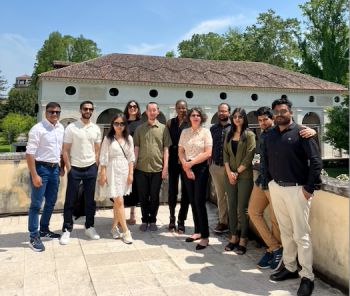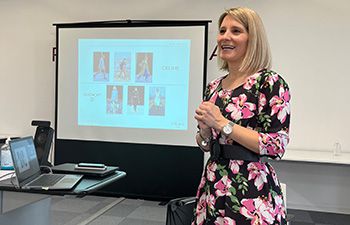Business School MBA students visit Veneto, Italy, to explore how innovation and tradition can coexist.
By: Gala Orsborn
Last updated: Wednesday, 5 July 2023

MBA students and staff with General Manager Nicola Serafin and Tommaso Galante, HR Director Europe - Brand HQ and Sales Subsidiaries for De’Longhi

Dr Zahira Jaser with MBA students outside the Villa Foscarini Rossi Shoe Museum

De'Longhi visit at their production plant, with Rudi Sperandio, Plant Operations Director and Vasco Buffolo, Plant Quality Manager

Alessia Fiorotto, Talent Acquisition and Development Manager at Rossimoda, welcoming the MBA students and staff
The Sussex Business School MBA students recently visited innovative companies and global brand leaders in the Veneto region of Italy, accompanied by the MBA Director Dr Zahira Jaser and the Deputy Director Claire Tingsager.
The Sussex MBA is uniquely based around four pillars: innovation, sustainability, digital work, and policy. This trip brought three of these pillars together - innovation, sustainability, and digital work.
The purpose of the trip was to explore the pillars through visits to companies operating in the Veneto region of Italy. Students visited several companies and explored them through the lens of innovation and tradition. Some of these integrated technology and innovation in the manufacturing process to improve sustainability and environmental practices, whilst remaining true to tradition; others produced very innovative designs albeit with very traditional techniques.
The four companies visited were the global group De’Longhi; the luxury shoe maker Rossimoda, now part of LVMH group; the family owned and run luxury glass maker Nason Moretti, and prosecco makers Villa Sandi.
De’Longhi, the number one bean-to-cup coffee machine producer in the world, is also the parent company to several other leading brands such as Kenwood, Braun, Ariete and Nutribullet. De’Longhi is a sustainability focused brand, creating products using innovative production methods. The students saw their major production facility in Italy, which was recently transformed into a digital factory, reducing their product lead time by 82%, and enabling them to reduce waste by 60%.
Roberto Ceschin, Chief People Officer at De'Longhi said:
“De'Longhi's strategic use of digital innovation has not only enhanced its manufacturing processes but has also contributed to its sustainability efforts. By leveraging data, sharing information, ensuring accessibility, and fostering a culture of innovation, De'Longhi has built its sustainability journey.”
The visit to Rossimoda revealed to students the best form of Italian manufacturing. With the company being a leader in traditional shoemaking since its creator Narciso Rossi opened his first small shoe shop in Capriccio di Vigonza, Veneto in 1947, Rossimoda is now part of the luxury fashion group LVMH. And from 2022 is the industrial platform for development and production of women and men shoes for Celine.
To this day they continue to use traditional methods to design and create their shoes by using ‘shoe lasts’ as the prototype for each individual shoe design. Despite their production process being highly manual and traditional, some of their processes are assisted by automated machines. These innovative digitalisation methods are present in the patternmaking and cutting stages of the shoes production. Automatic cutting machines reduces wastage, making the process more sustainable. Rossimoda demonstrates how innovation and tradition can co-exist happily, producing consistent and exceptional results.
Alessia Fiorotto,Talent Acquisition and Development Manager at Rossimoda said:
"In Rossimoda, tradition and innovation blend continuously. A timeless expertise, a deep passion for our work and for our product, attention to detail oriented towards the pursuit of manufacturing excellence; these are the distinctive elements of Rossimoda. Our strength is the valorization of our unique handcrafted savoir faire with a perspective always open to innovation and to the future."
The students also visited prestigious, family run glassmaking business Nason Moretti. Now in their centenary year, they have used traditional methods and recipes to produce their hand crafted, blown glass since 1923. They demonstrated the process of multicolour glass making at the forefront of design innovation, such as luxury tableware that they are currently producing for Dolce & Gabbana.
The visit to Villa Sandi, award winning masters of prosecco, exposed students to the traditional prosecco method. Among the world’s best 100 vineyards, Villa Sandi is known for their sustainability, they have their own hydroelectric power plant located within the company grounds. They also use solar panels and are ‘biodiversity friend’ certified, ensuring the protection of biodiversity, as well as animal and vegetal species within their vineyards and surrounding areas.
Commenting on the visit, Dr Zahira Jaser said:
“In designing this study trip we have taken great care to ensure the best educational experience for our students. They saw first-hand how innovation and tradition are coexisting forces that drive corporate strategies. We are so grateful to our corporate hosts, all leaders in their sector. The hope is that as students return to their home country and traditional industries, they understand how passion for the past can drive towards a more sustainable future.”
Vishal Malhotra, MBA student commented:
“The MBA study trip provided valuable insights into the practical application of theoretical concepts learned in the classroom, bridging the gap between academic knowledge and industry practices.”
Amy Wang, MBA student added:
"The trip was truly fantastic. I witnessed the impressive utilization of their rich histories by Rossimoda, De’Longhi, Villa Sandi, and Nason Moretti to drive innovation and maintain their competitive advantages. Throughout the trip, our MBA module knowledge seamlessly intertwined with our factory visits. For instance, Rossimoda's talent acquisition and management strategies showcased effective people organization. De’Longhi's international success demonstrated the power of strategic internationalization and their investment in industry 4.0 (Fourth Industrial Revolution) to enhance efficiency in its operation to keep their competitive advantages.”

